新概念英语第一册第49-50课课件(共31张PPT)
文档属性
| 名称 | 新概念英语第一册第49-50课课件(共31张PPT) | 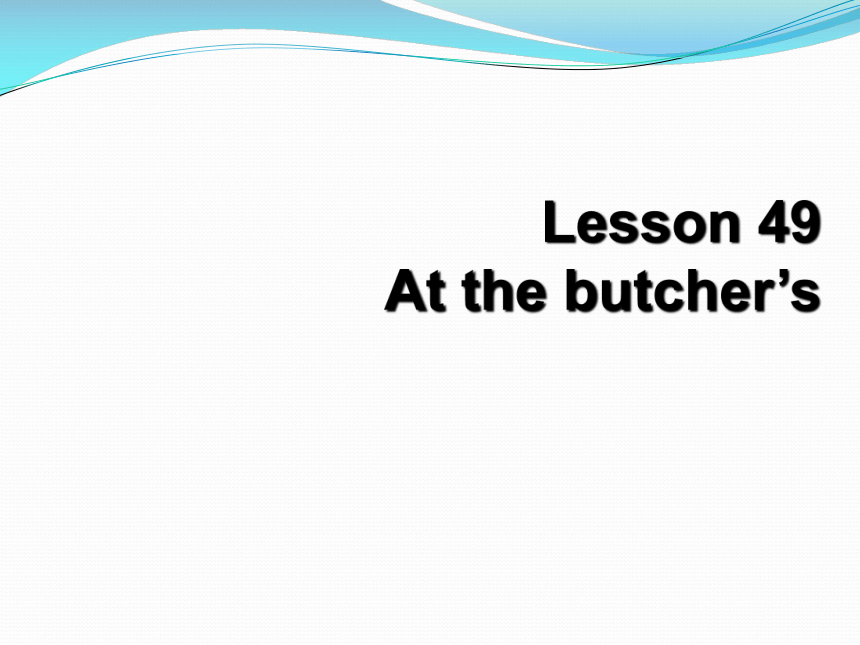 | |
| 格式 | ppt | ||
| 文件大小 | 2.1MB | ||
| 资源类型 | 教案 | ||
| 版本资源 | 新概念英语 | ||
| 科目 | 英语 | ||
| 更新时间 | 2023-10-06 13:29:04 | ||
图片预览

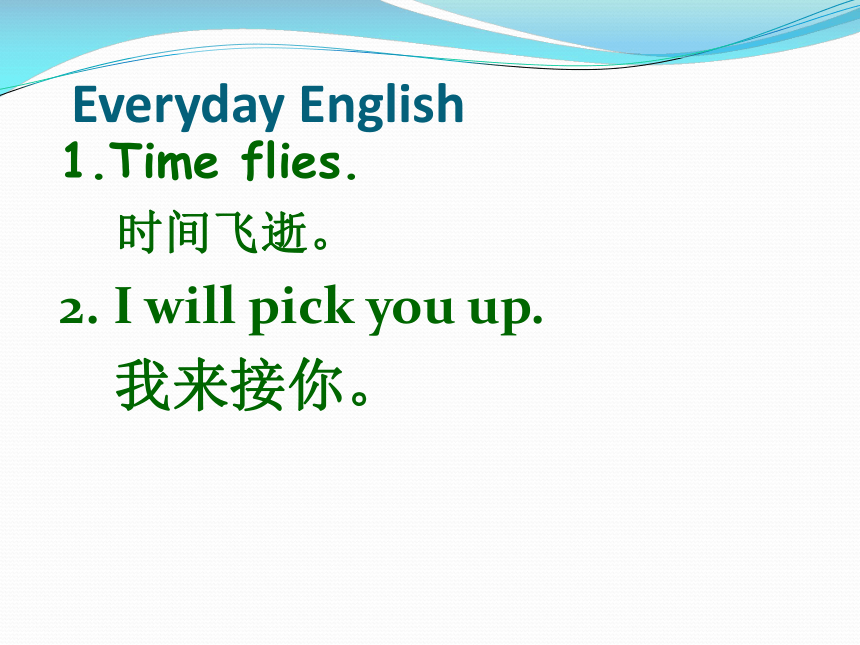
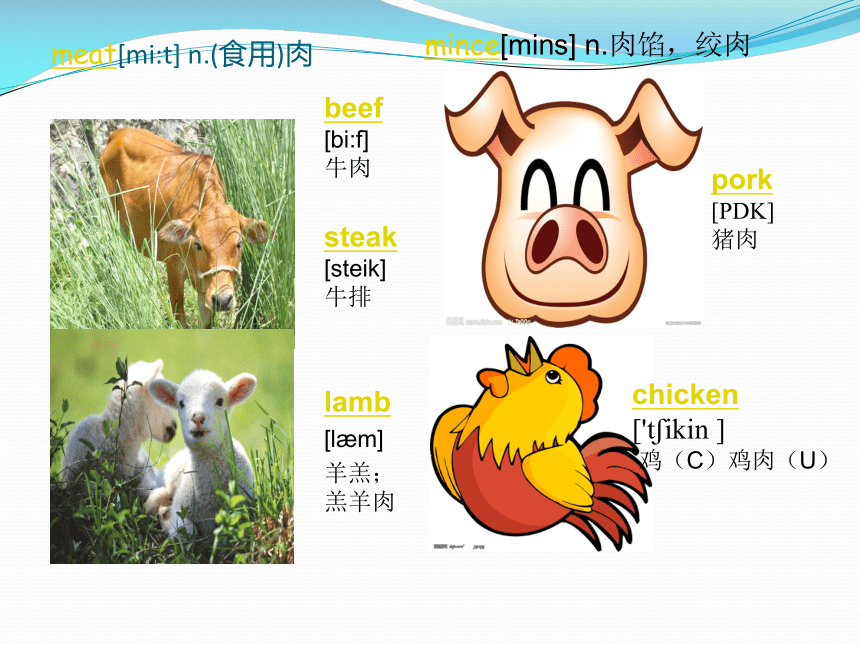
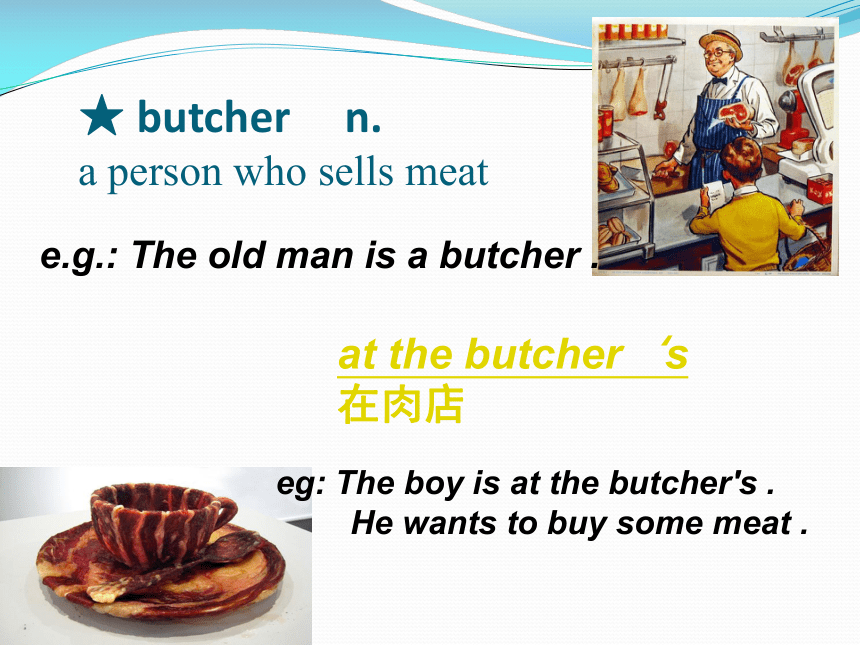
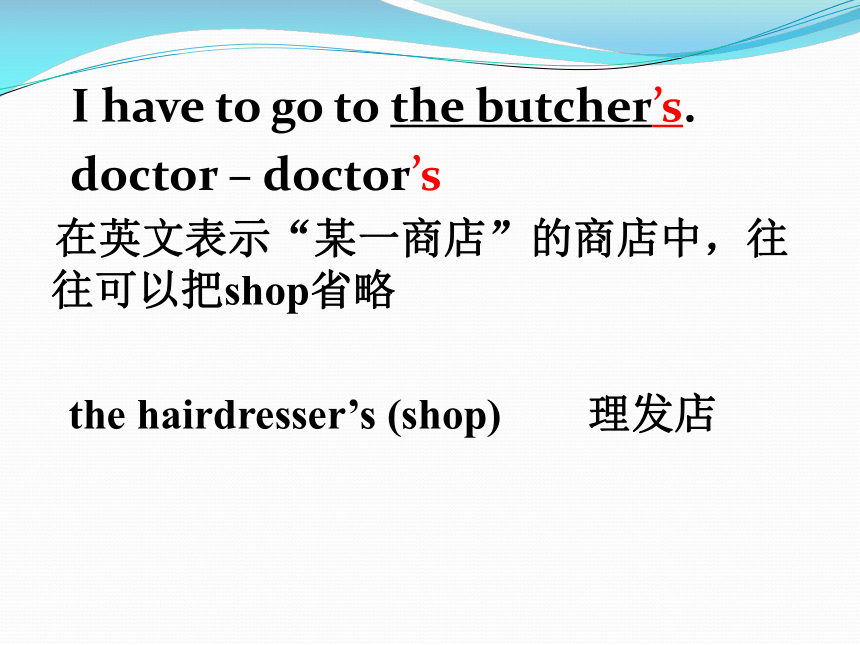
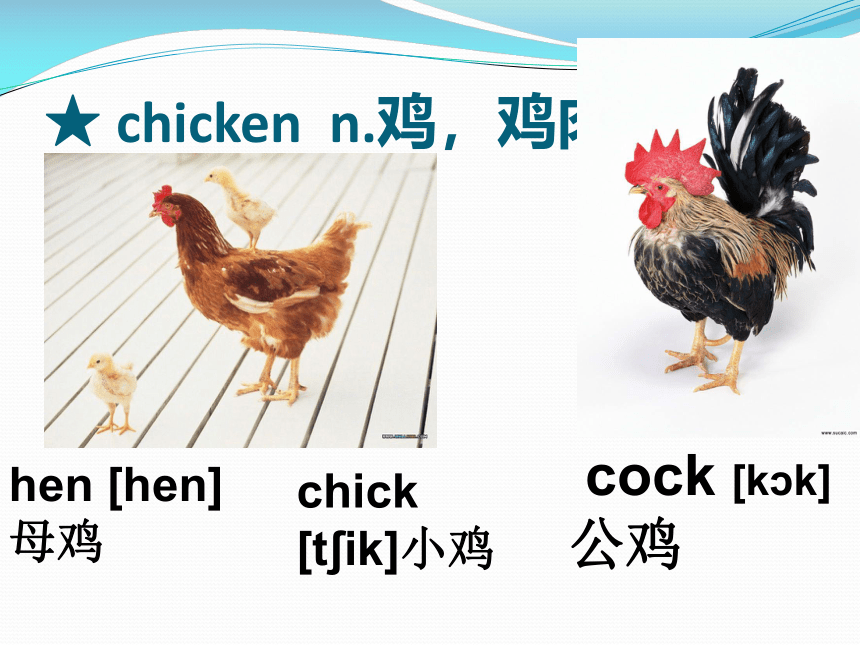
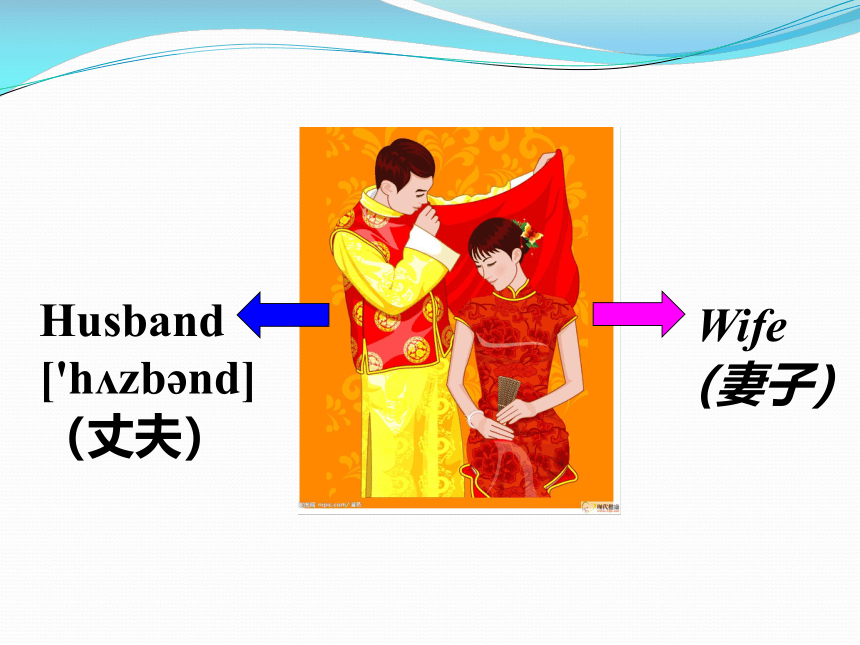
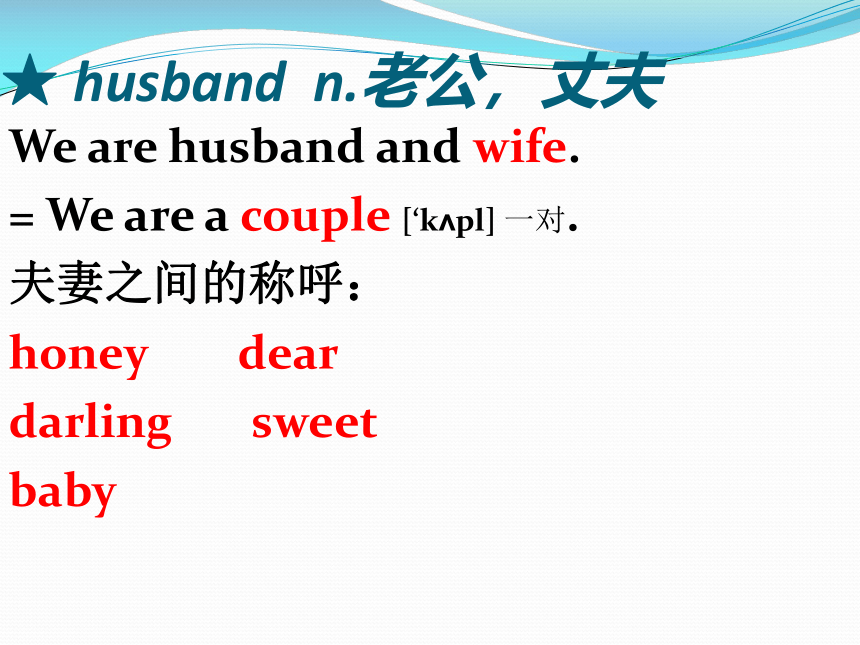
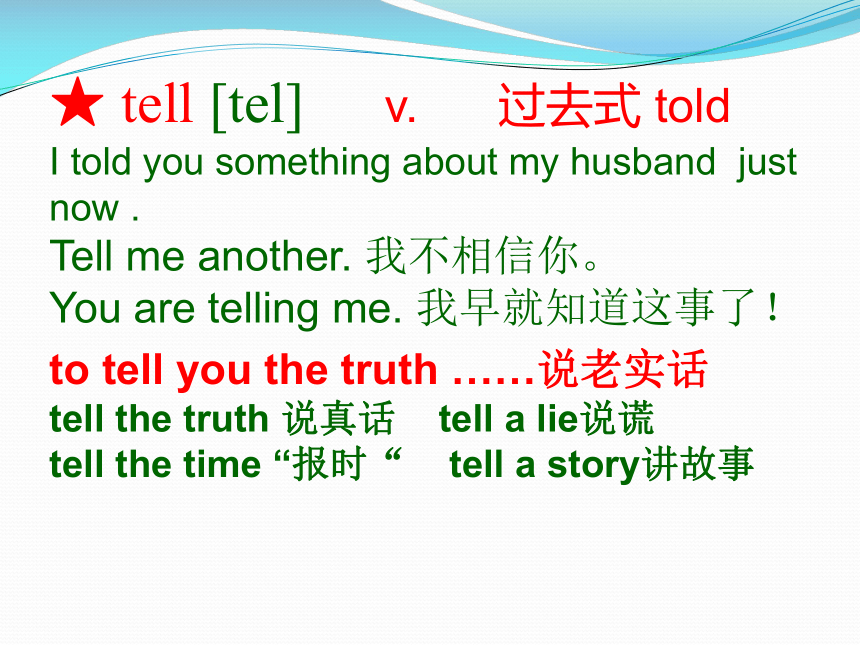

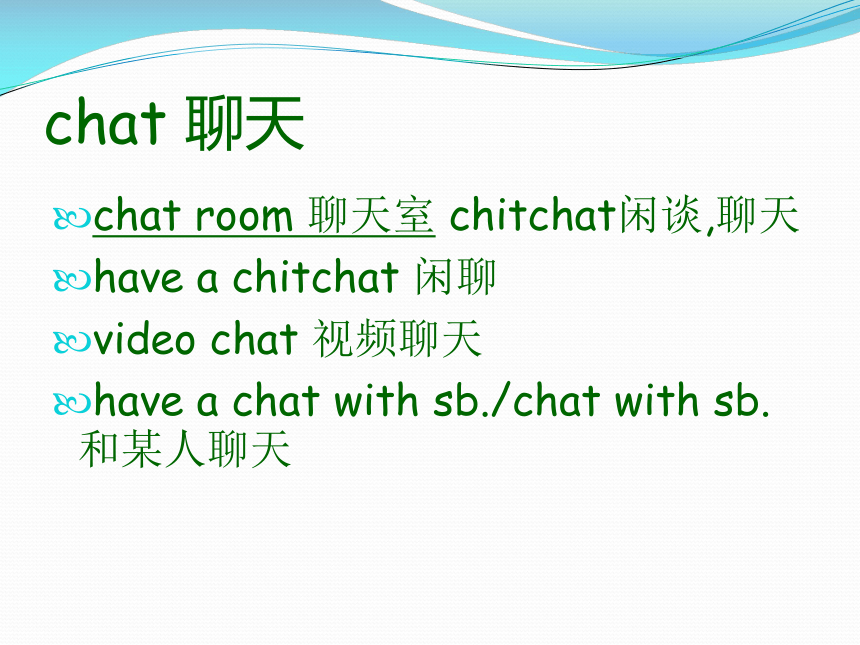
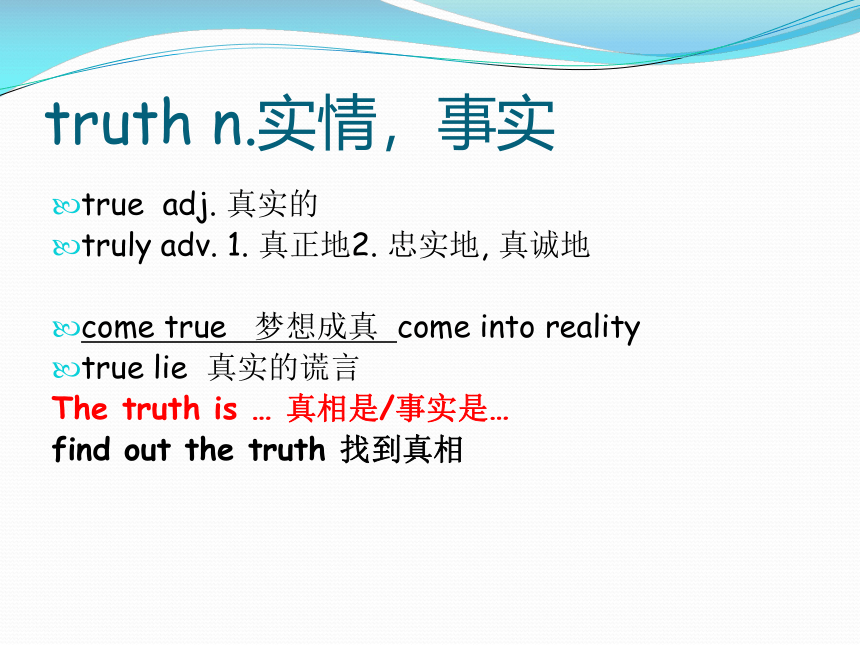
文档简介
(共31张PPT)
Lesson 49
At the butcher’s
Everyday English
1.Time flies.
时间飞逝。
2. I will pick you up.
我来接你。
meat[mi:t] n.(食用)肉
beef
[bi:f]
牛肉
steak
[steik]
牛排
lamb
[l m]
羊羔;羔羊肉
chicken
['t ikin ]
鸡(C)鸡肉(U)
pork
[PDK]
猪肉
mince[mins] n.肉馅,绞肉
★ butcher n.
a person who sells meat
e.g.: The old man is a butcher .
at the butcher‘s
在肉店
eg: The boy is at the butcher's . He wants to buy some meat .
I have to go to the butcher’s.
doctor – doctor’s
在英文表示“某一商店”的商店中,往往可以把shop省略
the hairdresser’s (shop) 理发店
★ chicken n.鸡,鸡肉
cock [k k]公鸡
hen [hen]母鸡
chick [t ik]小鸡
Wife
(妻子)
Husband
['h zb nd]
(丈夫)
★ husband n.老公,丈夫
We are husband and wife.
= We are a couple [‘k pl] 一对.
夫妻之间的称呼:
honey dear
darling sweet
baby
★ tell [tel] v. 过去式 told
I told you something about my husband just now .
Tell me another. 我不相信你。
You are telling me. 我早就知道这事了!
to tell you the truth ……说老实话
tell the truth 说真话 tell a lie说谎
tell the time “报时“ tell a story讲故事
▲talk意为“讲、谈论,谈话”
have a talk with 意为“与......交谈”
give a talk做报告 (talk n.报告)
have a talk听报告
talk show 脱口秀
chat 聊天
chat room 聊天室 chitchat闲谈,聊天
have a chitchat 闲聊
video chat 视频聊天
have a chat with sb./chat with sb. 和某人聊天
truth n.实情,事实
true adj. 真实的
truly adv. 1. 真正地2. 忠实地, 真诚地
come true 梦想成真 come into reality
true lie 真实的谎言
The truth is … 真相是/事实是…
find out the truth 找到真相
★ either ['ai ] adv. 也(用于否定句)
My husband likes steak .
I like steak, too .
=I also like steak .
Do you like steak too
My husband doesn‘t like chicken.
I don't like chicken, either .
either一般用于否定句,位于句末,前面通常有逗号。
too常用于肯定句,有时也用于疑问句,但不能用于否定句。常见于句末,too前常有逗号;如果不在句末,too前后都应当有逗号。
also 用于肯定句中,位于居中
Listening
Mrs. Bird like lamb.
Mrs. Bird’s husband
like lamb too.
3. Mrs. Bird like chicken.
4.Mrs. Bird doesn’t like chicken.
5. Mrs. Bird’s husband
doesn’t like steak.
Yes
No
Yes
No
No
BUTCHER: Do you want any meat today, Mrs. Bird
MRS.BIRD: Yes, please.
BUTCHER: Do you want beef or lamb
MRS.BIRD: Beef, please.
BUTCHER: This lamb's very good.
MRS.BIRD: I like lamb, but my husband doesn't.
BUTCHER: What about some steak This is a nice piece.
MRS.BIRD: Give me that piece, please.
MRS.BIRD: And a pound of mince, too.
BUTCHER: Do you want a chicken, Mrs. Bird They 're very nice.
MRS.BIRD: No, thank you.
MRS.BIRD: My husband likes steak, but he doesn't like chicken.
BUTCHER: To tell you the truth, Mrs. Bird, I don't like chicken either!
At the butcher’s
方位副词at与in的区别是,at和in在…里;但at表示的地方较小,而in表示的地方很大,例:
at the school
at home
in China
in Asia
in Changzhou
Detailed study about the passage
What about some steak
来点牛排怎么样?
=How about 怎么样?/如何?
You look blue, how about watching a movie together
-You don’t like beef What about pork Or lamb
He is going to dance, how about you
搞个聚会怎么样?
Grammar
助动词 do, does
在英语中,助动词一般没有词义,主要帮助构成谓语,表示时态,语态或构成疑问及否定。
do :主语为 I, you及复数时。
do not = don’t (否定形式)
does :主语为第三人称单数时。
does not = doesn’t (否定形式)
5. 你喜欢Tank吗?
她喜欢Tank 吗?
Do you like Tank
Does she like Tank
肯定句
主语+动词~
我每天说英语。
I speak English every day.
他每天说英语。
He speaks English every day.
注:主语是第三人称单数时,动词要加s,或es
否定句
主语+don’t / doesn’t +动词~
在助动词后加not
我不是每天说英语。
I don’t speak English every day.
他不是每天说英语。
He doesn’t speak English every day.
疑问句将助动词提前
Do / Does + 主语+动词~
你每天说英语吗?
Do you speak English every day
他每天说英语吗 ?
Does he speak English every day
vegetables & fruit
Tomato
[t 'mɑ:t u]
potato[p 'teit u]
cabbage['k bid ]
Pear [p e ]
grape [greip]
peach[pi:t ]
lettuce['letis]
Pea [bi:n]
Bean [pi:]
New Words and Expressions
tomato 西红柿
potato 土豆
cabbage 卷心菜
lettuce 莴苣
pea 豌豆
bean 豆角
pear 梨
grape 葡萄
peach 桃
完成练习第100页
Assignments:
1.听写并背诵第49课课文;
2.完成练习册第49课、第50课;
Lesson 49
At the butcher’s
Everyday English
1.Time flies.
时间飞逝。
2. I will pick you up.
我来接你。
meat[mi:t] n.(食用)肉
beef
[bi:f]
牛肉
steak
[steik]
牛排
lamb
[l m]
羊羔;羔羊肉
chicken
['t ikin ]
鸡(C)鸡肉(U)
pork
[PDK]
猪肉
mince[mins] n.肉馅,绞肉
★ butcher n.
a person who sells meat
e.g.: The old man is a butcher .
at the butcher‘s
在肉店
eg: The boy is at the butcher's . He wants to buy some meat .
I have to go to the butcher’s.
doctor – doctor’s
在英文表示“某一商店”的商店中,往往可以把shop省略
the hairdresser’s (shop) 理发店
★ chicken n.鸡,鸡肉
cock [k k]公鸡
hen [hen]母鸡
chick [t ik]小鸡
Wife
(妻子)
Husband
['h zb nd]
(丈夫)
★ husband n.老公,丈夫
We are husband and wife.
= We are a couple [‘k pl] 一对.
夫妻之间的称呼:
honey dear
darling sweet
baby
★ tell [tel] v. 过去式 told
I told you something about my husband just now .
Tell me another. 我不相信你。
You are telling me. 我早就知道这事了!
to tell you the truth ……说老实话
tell the truth 说真话 tell a lie说谎
tell the time “报时“ tell a story讲故事
▲talk意为“讲、谈论,谈话”
have a talk with 意为“与......交谈”
give a talk做报告 (talk n.报告)
have a talk听报告
talk show 脱口秀
chat 聊天
chat room 聊天室 chitchat闲谈,聊天
have a chitchat 闲聊
video chat 视频聊天
have a chat with sb./chat with sb. 和某人聊天
truth n.实情,事实
true adj. 真实的
truly adv. 1. 真正地2. 忠实地, 真诚地
come true 梦想成真 come into reality
true lie 真实的谎言
The truth is … 真相是/事实是…
find out the truth 找到真相
★ either ['ai ] adv. 也(用于否定句)
My husband likes steak .
I like steak, too .
=I also like steak .
Do you like steak too
My husband doesn‘t like chicken.
I don't like chicken, either .
either一般用于否定句,位于句末,前面通常有逗号。
too常用于肯定句,有时也用于疑问句,但不能用于否定句。常见于句末,too前常有逗号;如果不在句末,too前后都应当有逗号。
also 用于肯定句中,位于居中
Listening
Mrs. Bird like lamb.
Mrs. Bird’s husband
like lamb too.
3. Mrs. Bird like chicken.
4.Mrs. Bird doesn’t like chicken.
5. Mrs. Bird’s husband
doesn’t like steak.
Yes
No
Yes
No
No
BUTCHER: Do you want any meat today, Mrs. Bird
MRS.BIRD: Yes, please.
BUTCHER: Do you want beef or lamb
MRS.BIRD: Beef, please.
BUTCHER: This lamb's very good.
MRS.BIRD: I like lamb, but my husband doesn't.
BUTCHER: What about some steak This is a nice piece.
MRS.BIRD: Give me that piece, please.
MRS.BIRD: And a pound of mince, too.
BUTCHER: Do you want a chicken, Mrs. Bird They 're very nice.
MRS.BIRD: No, thank you.
MRS.BIRD: My husband likes steak, but he doesn't like chicken.
BUTCHER: To tell you the truth, Mrs. Bird, I don't like chicken either!
At the butcher’s
方位副词at与in的区别是,at和in在…里;但at表示的地方较小,而in表示的地方很大,例:
at the school
at home
in China
in Asia
in Changzhou
Detailed study about the passage
What about some steak
来点牛排怎么样?
=How about 怎么样?/如何?
You look blue, how about watching a movie together
-You don’t like beef What about pork Or lamb
He is going to dance, how about you
搞个聚会怎么样?
Grammar
助动词 do, does
在英语中,助动词一般没有词义,主要帮助构成谓语,表示时态,语态或构成疑问及否定。
do :主语为 I, you及复数时。
do not = don’t (否定形式)
does :主语为第三人称单数时。
does not = doesn’t (否定形式)
5. 你喜欢Tank吗?
她喜欢Tank 吗?
Do you like Tank
Does she like Tank
肯定句
主语+动词~
我每天说英语。
I speak English every day.
他每天说英语。
He speaks English every day.
注:主语是第三人称单数时,动词要加s,或es
否定句
主语+don’t / doesn’t +动词~
在助动词后加not
我不是每天说英语。
I don’t speak English every day.
他不是每天说英语。
He doesn’t speak English every day.
疑问句将助动词提前
Do / Does + 主语+动词~
你每天说英语吗?
Do you speak English every day
他每天说英语吗 ?
Does he speak English every day
vegetables & fruit
Tomato
[t 'mɑ:t u]
potato[p 'teit u]
cabbage['k bid ]
Pear [p e ]
grape [greip]
peach[pi:t ]
lettuce['letis]
Pea [bi:n]
Bean [pi:]
New Words and Expressions
tomato 西红柿
potato 土豆
cabbage 卷心菜
lettuce 莴苣
pea 豌豆
bean 豆角
pear 梨
grape 葡萄
peach 桃
完成练习第100页
Assignments:
1.听写并背诵第49课课文;
2.完成练习册第49课、第50课;
同课章节目录
